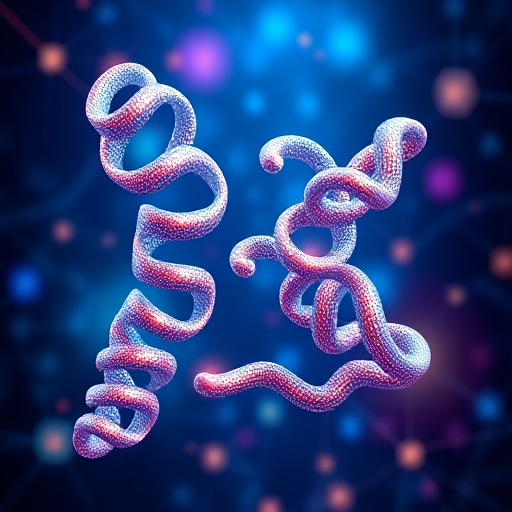Proteins are the fundamental building blocks of life, responsible for virtually every function within biological organisms. They act as enzymes catalyzing biochemical reactions, provide structural support, regulate hormones, and perform countless other vital roles. The functionality of a protein is determined by its three-dimensional shape, which is dictated by its sequence of amino acids—the protein’s primary structure. Predicting how a protein folds into its complex, three-dimensional form based solely on its amino acid sequence has been one of the most significant challenges in molecular biology, known as the protein folding problem.
In a groundbreaking advancement, DeepMind’s artificial intelligence system, AlphaFold, has made remarkable strides in solving this decades-old puzzle. By accurately predicting protein structures, AlphaFold stands to revolutionize biology, medicine, and biotechnology, opening new avenues for drug discovery, understanding diseases, and developing novel therapies.
The Protein Folding Problem
Understanding Protein Structure and Function
Proteins are composed of 20 different amino acids linked together in linear chains. These chains fold into specific three-dimensional structures, creating the protein’s unique shape essential for its function. The folding process is governed by various chemical interactions, including hydrogen bonds, hydrophobic interactions, and disulfide bridges. Misfolded proteins can lose functionality or become toxic, leading to diseases such as Alzheimer’s, Parkinson’s, and cystic fibrosis.
Historical Challenges in Protein Structure Determination
Determining protein structures experimentally has traditionally relied on techniques like X-ray crystallography, nuclear magnetic resonance (NMR) spectroscopy, and cryo-electron microscopy. While effective, these methods are time-consuming, expensive, and not always feasible for all proteins—particularly those that are large, membrane-bound, or difficult to crystallize.
Computational Approaches and the Levinthal Paradox
Computational methods have long sought to predict protein structures from amino acid sequences. The challenge lies in the astronomical number of possible ways a protein can fold—a concept known as the Levinthal paradox. It states that it would take longer than the age of the universe to sample all possible conformations randomly, highlighting the need for effective predictive algorithms.
The Emergence of AlphaFold
DeepMind’s Entry into Biological Sciences
DeepMind, an AI research lab owned by Alphabet Inc., gained prominence through its AI programs that mastered complex games like Go and chess. Recognizing the potential of AI in solving scientific problems, DeepMind turned its attention to the protein folding problem, assembling a team of experts in machine learning, biology, and physics.
Development of AlphaFold
The initial version, AlphaFold1, introduced in 2018, utilized deep learning techniques to predict protein structures by estimating the distances between amino acid pairs and their angles. It won the 13th Critical Assessment of protein Structure Prediction (CASP13) competition but still had limitations in accuracy.
AlphaFold’s Breakthrough in Protein Structure Prediction
Performance in CASP14
The CASP competition is a biennial event that benchmarks the performance of protein structure prediction methods. In CASP14, AlphaFold2 achieved a median Global Distance Test (GDT) score of 92.4 out of 100 across all targets, with many predictions rivaling the accuracy of experimental methods. This performance was unprecedented and signified that the protein folding problem, for many practical purposes, had been solved.
Technical Innovations Behind AlphaFold
AlphaFold2’s success is attributed to several key innovations:
End-to-End Deep Learning
Unlike previous methods that separated distance prediction and structure generation, AlphaFold2 integrated these steps into a single model, allowing for more cohesive predictions.
Use of Multiple Sequence Alignments (MSAs)
By analyzing evolutionary information from homologous protein sequences across different species, AlphaFold identifies conserved regions and patterns crucial for accurate folding predictions.
Attention Mechanisms
Inspired by natural language processing, attention mechanisms allow the model to focus on specific parts of the amino acid sequence, capturing both local and long-range interactions.
Iterative Refinement
The model refines its predictions through multiple cycles, improving accuracy by reassessing and adjusting the structure based on the latest information.
Impact on the Scientific Community
The success of AlphaFold was met with widespread acclaim. Dr. Janet Thornton, Director Emeritus of the European Bioinformatics Institute, stated that AlphaFold would “change everything” in structural biology. The ability to predict protein structures rapidly accelerates research across various domains, from fundamental biology to applied sciences.
Implications for Science and Medicine
Accelerating Drug Discovery and Development
Accurate protein structures enable researchers to understand disease mechanisms at the molecular level. Drug discovery often targets specific proteins involved in disease pathways. With AlphaFold, scientists can identify binding sites, design drugs more efficiently, and predict potential side effects by analyzing interactions with other proteins.
Understanding Genetic Diseases
Many genetic diseases result from mutations that alter protein folding and function. AlphaFold can model these mutant proteins, helping researchers understand how specific changes affect structure and lead to disease, paving the way for personalized medicine and targeted therapies.
Advancements in Enzyme Engineering
Enzymes are proteins that catalyze biochemical reactions. Engineering enzymes with desired properties has applications in industrial processes, biofuels, and environmental remediation. AlphaFold’s predictions facilitate the design of enzymes with enhanced efficiency, stability, or specificity.
Insights into Evolution and Biology
By predicting structures of proteins from extinct organisms or those with unknown functions, AlphaFold can help reconstruct evolutionary relationships and uncover the roles of mysterious proteins, enriching our understanding of biology.
Response to Emerging Health Threats
In situations like the COVID-19 pandemic, rapid structural information about viral proteins is critical. AlphaFold contributed by predicting structures of SARS-CoV-2 proteins, aiding in vaccine development and antiviral research.
Challenges and Limitations
Complex Protein Interactions
Many proteins function as part of larger complexes or interact with other biomolecules like DNA, RNA, and lipids. AlphaFold’s predictions for isolated proteins may not fully capture these interactions, limiting its applicability in understanding multi-component systems.
Protein Dynamics and Flexibility
Proteins are dynamic entities, often undergoing conformational changes essential for their function. AlphaFold predicts static structures representing the lowest energy state, which may not reflect all functional conformations or transient states important in biological processes.
Intrinsically Disordered Proteins
Some proteins or regions within proteins are intrinsically disordered, lacking a fixed structure until they interact with other molecules. Predicting the behavior of these proteins remains challenging for AlphaFold and other computational methods.
Computational and Resource Constraints
While DeepMind has made AlphaFold’s code and models available, running these predictions requires substantial computational resources. Access to high-performance computing infrastructure may be limited for some researchers, potentially creating disparities in scientific progress.
Ethical Considerations and Data Privacy
The integration of AI in biology raises ethical questions regarding data usage, consent, and privacy, particularly with human proteins and genetic information. Ensuring transparent practices and adherence to ethical guidelines is essential.
Future Directions and Developments
Enhancing Predictions for Complex Systems
Research is ongoing to extend AlphaFold’s capabilities to predict protein complexes, interactions, and the effects of post-translational modifications, which are crucial for a comprehensive understanding of cellular functions.
Integration with Experimental Methods
Combining AlphaFold’s predictions with experimental data can validate and refine models. Techniques like cryo-EM and NMR can provide complementary insights, particularly for dynamic or complex systems.
Customizing for Specific Applications
Tailoring models to focus on specific types of proteins or diseases could enhance accuracy and relevance, aiding in fields like oncology, neuroscience, or immunology.
Educational and Collaborative Platforms
Making AlphaFold’s predictions accessible through user-friendly databases and visualization tools empowers researchers worldwide. Initiatives like the AlphaFold Protein Structure Database, developed in collaboration with the European Molecular Biology Laboratory’s European Bioinformatics Institute (EMBL-EBI), democratize access to structural data.
Addressing Ethical and Societal Implications
Engaging with ethicists, policymakers, and the public to discuss the implications of AI in biology will help navigate challenges related to data ownership, consent, and equitable access to technological advancements.
Conclusion
DeepMind’s AlphaFold has ushered in a new era in molecular biology, providing a solution to the longstanding protein folding problem. By leveraging advanced AI and deep learning techniques, AlphaFold offers accurate and rapid predictions of protein structures, with far-reaching implications for science and medicine.
The ability to understand proteins at this level accelerates research, drives innovation, and holds the promise of addressing some of humanity’s most pressing health challenges. As we continue to explore the complexities of life at the molecular scale, tools like AlphaFold will be invaluable in unlocking the secrets of biology and translating them into tangible benefits for society.

